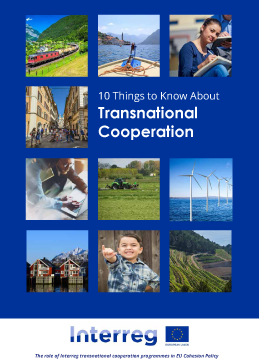Interreg transnational cooperation programmes have been operational for more than 20 years, implementing actions in the framework of the EU Cohesion Policy. These programmes bring together European regions and cities that are located in different countries yet are sharing many challenges and opportunities due to their common geography, history, and culture. The geographic and cultural similarities defining the transnational programme areas provide an excellent basis for cooperation. In tra
- 12 February 2018

Interreg transnational cooperation programmes have been operational for more than 20 years, implementing actions in the framework of the EU Cohesion Policy. These programmes bring together European regions and cities that are located in different countries yet are sharing many challenges and opportunities due to their common geography, history, and culture.
The geographic and cultural similarities defining the transnational programme areas provide an excellent basis for cooperation. In transnational projects, actors from the private and public sectors, universities and civil society organisations work closely together to advance new or improved solutions designed to meet the most pressing needs of their populations. But what does that mean in real terms? What do transnational cooperation projects and their results imply for the regions, cities, and citizens? Whilst it is impossible to present the full scope, diversity and added value of transnational cooperation in just a few pages, the publication '10 Things to Know About Transnational Cooperation' aims at providing a flavour of what is the role and achievements of Interreg transnational/interregional programmes across Europe.
The document was prepared by an informal working group including representatives from Interreg transnational programmes and Interreg Europe, with the support and facilitation of Interact.
